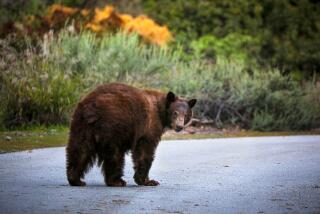In the Hunt: 7 States Make It the Year of the Animal : Measures run gamut, from banning baiting and hounding to repealing a ban. They pit rights groups against hunting interests.
- Share via
MANISTEE, Mich. — Big, fast and clever, the American black bear has roamed the deep forests of this state for hundreds of years, proving a most elusive quarry for hunters.
“We call him the ‘ghost of the woods,’ ” said Chris Schumacher, a bear expert for the U.S. Forest Service here. “He’s very adept at staying out of sight when man is around.”
To even the odds, Michigan hunters rely on two tactics: dogs bred and trained to chase bears, and “bait stands” loaded with raw meat and other food to lure bears out of hiding. More than 90% of the bears killed during the spring and fall hunting seasons in Michigan are felled by hunters using hounds, bait stands or both.
Now, hounding and baiting are at the heart of a dispute pitting animal-protection groups against the National Rifle Assn., among other combatants. At issue is a measure on the Michigan ballot in November to outlaw hounding and baiting as unsporting and cruel.
Indeed, Michigan is one of seven states with ballot measures this year involving animal protection and wildlife management--an unprecedented number, according to officials at the Humane Society of the United States. Six of the measures are backed by animal-protection groups and would restrict hunting; one is being pushed by hunting interests and would lift a restriction passed two years ago.
One reason for what could be called the Year of the Animal in state initiatives was the resounding defeat last March in California of a measure that could have led to repeal of the state’s ban on hunting mountain lions. That spurred an increase in lobbying and petition-passing efforts in other states by animal-protection groups, such as the Humane Society, on behalf of proposals they back.
Aside from the Michigan measure, here is a look at the other hunting-related issues to be decided next month:
* In Alaska, Measure 3 would prohibit hunters from spotting wolves, foxes, lynxes and wolverines from airplanes and then landing that same day to shoot them.
* In Colorado, Amendment 14 would ban leghold traps and other body-gripping traps, except where they are needed to protect livestock or humans from predators.
* In Idaho, Proposition 2 would ban the hunting of black bears during the spring and ban baiting and hounding of the animals.
* In Massachusetts, Question 1 would ban traps, prohibit the hounding of bears and bobcats and decrease the influence of hunters and trappers on the state Fisheries and Wildlife Board.
* In Washington state, Initiative 655 would ban baiting for bears and hounding of bears, cougars, bobcats and lynx.
* In Oregon, Measure 34 would repeal the 1994 ban on baiting for bears and hounding of bears and mountain lions.
Wayne Pacelle, vice president of the Humane Society, said the increasing number of animal measures represent an attempt to wrest control of wildlife regulations from groups representing hunting and trapping interests.
“For 60 years, wildlife rules and wildlife agencies have been controlled by a small interest group that has resisted even modest change,” he said. “In those 60 years, the public’s attitude toward animals has evolved greatly and now the public has decided that everyone . . . has a right to set the rules.”
Officials with the NRA retort that the Humane Society and others are trying to persuade voters to disregard the advice of wildlife experts who say that hunting helps preserve animal populations by keeping them from outstripping their food supply.
“What these extremist groups are trying to do is win with arguments that are emotional rather than scientific,” said Susan Lamson, director of the NRA’s conservation, wildlife and natural resources division.
Overtones of California’s mountain lion controversy can be heard in Michigan’s bear debate.
Citizens United for Bears (CUB), the group that gathered signatures to get the measure on the ballot, copied a campaign stratagem that worked well in California: a television ad showing a frightened animal--in this case, a small bear--being chased up a tree by dogs and shot by hunters.
State legislators and others who oppose the bear initiative warn that if hunting is curtailed, the bear population will explode and soon bears will be menacing humans.
“The agenda of the animal-rights movement is pretty clear: to take away hunting opportunities piece by piece until hunting is outlawed,” fumes state Sen. Mat Dunaskiss, a Republican who keeps on his desk the skull of a bear he killed with a bow and arrow.
There is also the argument, in Michigan and elsewhere, that hunting is an American birthright and should not be abridged.
CUB leader Tony Holmes responds that his group is not against hunting, just “slop hunting.”
“Hunting by definition means tracking into the woods and matching wits with an animal, not ambushing an animal when it’s eating or letting dogs with radio transmitters in their collars chase them up a tree so you can follow in your four-wheel,” he said. “Hunting is more than killing.”
More to Read
Sign up for Essential California
The most important California stories and recommendations in your inbox every morning.
You may occasionally receive promotional content from the Los Angeles Times.










